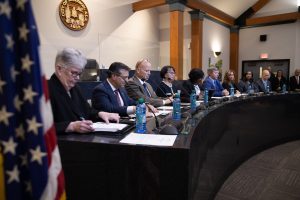Brooks holds STEM hearing at BJHS
From Left to Right: Dr. Camille H. Wright, Director of Secondary Instruction, Madison City Schools, Dr. Robert A. Altenkirch, President, University of Alabama - Huntsville, Dr. Marilyn C. Beck, President, Calhoun Community College, Dr. Neil Lamb, Director of Educational Outreach, HudsonAlpha Institute, Mr. Andrew Partynski, Chief Technology Officer, Science Applications International Corporation
Education officials and politicians gathered at Bob Jones High School Monday morning for a hearing on local science, technology, engineering, and mathematics (STEM) education programs and partnerships.
Hosted by Rep. Mo Brooks, the panel included Dr. Camille H. Wright, director of secondary instruction for Madison City Schools; Dr. Robert A. Altenkirch, president of the University of Alabama – Huntsville; Dr. Marilyn C. Beck, president of Calhoun Community College; Dr. Neil Lamb, director of educational outreach for HudsonAlpha Institute; Dr. Andrew Partynski, chief technology officer for Science Applications International Corporation.
“Our commitment to STEM education is exemplified by contributions to STEM programs in the community by the University of Alabama-Huntsville’s Propulsion Research Center and related scholarships and the U.S. Space and Rocket Center’s educational programs,” Brooks said in his opening statements.
Brooks said North Alabama is an “ideal” place to promote STEM education.
For Madison City Schools, Wright said the school system offers “a vast array” of courses, clubs and after school activities in the STEM field.
“Bob Jones High School offers nine Advance Placement courses in the fields of science, technology and mathematics,” she said. “In most of these career and technical education programs, the terminating course includes some type of internship in the field.”
She stated that 60 percent of level three engineering students are interning at businesses such as Boeing, Adtran, SAIC and HudsonAlpha.
Wright said every elementary and middle school in Madison is an Alabama, Math, Science and Technology Initiative School.
“We use an integrated philosophy to teaching Stem courses,” she said. “Research shows that students learn better when they think, plan, reason, compute and evaluate as a means to solve problems in order to master the content.”
Examples Wright gave were the use of iPads as part of the school system’s tutoring program that is funded through a Department of Defense grant.
Wright said in order to maintain student interest in math and science, educators have to show the linkages between the concepts taught in school and its application to life.
“For too long, students have viewed science as a set of historical facts that does not apply to their daily routines,” she said. Connecting to health, food and their environment is critical to answering their question, ‘why do we have to know this’?”

















